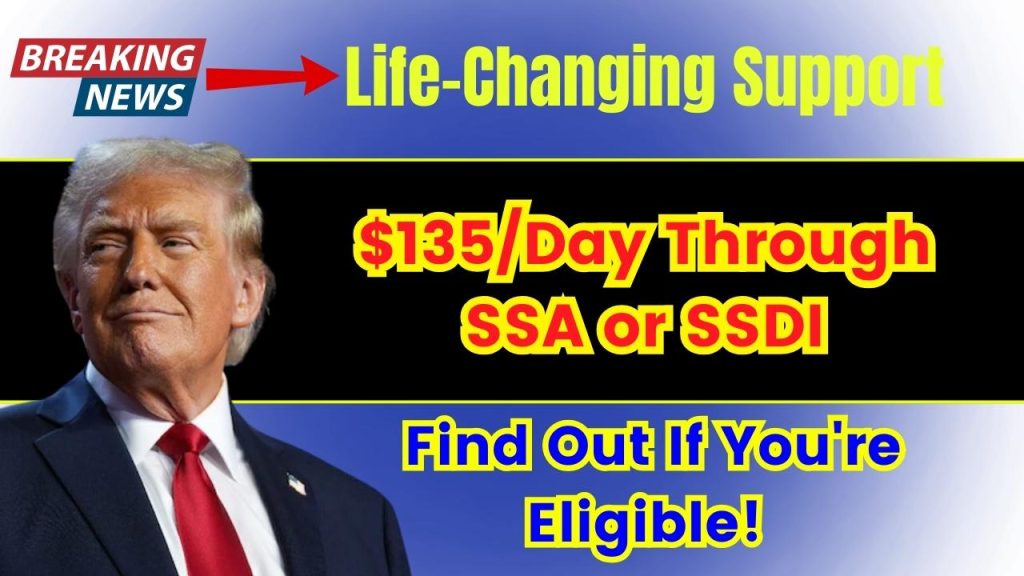$135/Day Through SSA or SSDI: If you’ve come across news about receiving $135 per day through SSA or SSDI, you’re likely wondering whether it’s real, how it works, and most importantly, if you’re eligible. The idea of getting that kind of financial support can feel overwhelming and exciting—especially if you’re facing uncertainty due to a disability or limited income. The truth is, while the Social Security Administration (SSA) doesn’t officially offer a flat $135 per day, the combined benefits you receive through SSDI and/or SSI could add up to that amount or even more.

Let’s take a closer look at how these benefits work, who can receive them, and what steps you need to take to find out if you qualify. This guide is designed for everyone—whether you’re new to government benefits or a professional exploring options for clients or family members. We’ll break things down in simple terms but offer plenty of insights and official resources so you can feel confident and informed every step of the way.
$135/Day Through SSA or SSDI
| Feature | Details |
|---|---|
| Program Names | Social Security Disability Insurance (SSDI), Supplemental Security Income (SSI) |
| Potential Benefit Amount | Up to $135/day (approx. $4,050/month), depending on eligibility |
| Eligibility | Based on disability, income, work history, and assets |
| Administered By | Social Security Administration (SSA) |
| Official Website | www.ssa.gov |
| Application Methods | Online, by phone, or in person at a local SSA office |
| Benefit Adjustment | Annual Cost-of-Living Adjustment (COLA) |
| Resources for Help | Free legal aid, disability advocates, SSA support staff |
Receiving up to $135 per day through SSA or SSDI isn’t automatic, but it’s entirely possible depending on your situation. These benefits provide a vital lifeline for individuals who are no longer able to work due to serious medical conditions or aging. Understanding your rights, knowing the process, and advocating for yourself (or getting help from someone who can) can make a massive difference.
Take that first step. Use the SSA tools, talk to a representative, and prepare your documentation. Life-changing support could be just a few steps away.
Understanding SSA and SSDI Benefits
What is SSDI?
Social Security Disability Insurance (SSDI) is a federal program created to support individuals who have worked and paid Social Security taxes but can no longer work due to a qualifying medical condition. It’s not a handout—it’s insurance you’ve paid into with every paycheck. SSDI pays a monthly benefit based on your lifetime earnings, and these benefits are available until you reach retirement age, at which point your SSDI converts to standard Social Security retirement benefits.
What is SSI?
Supplemental Security Income (SSI) is designed for those who haven’t worked enough to qualify for SSDI but still need assistance. SSI provides essential financial help for older adults (65+), blind individuals, or people with disabilities who have limited income and resources. The amount you receive is based on federal limits, but many states offer additional payments.
SSI is truly a safety net, helping the most vulnerable members of society maintain a basic standard of living. For more details, visit the SSA’s Benefits Overview Page.
How Do You Qualify for Up to $135 Per Day?
You won’t see a “$135 per day” checkbox on your application, but when benefits are combined and maximized, it’s possible to receive this amount or more. Here’s how the numbers break down.
1. Eligibility for SSDI
To qualify, you must:
- Be under full retirement age (usually 66 or 67)
- Have a medical condition that prevents substantial gainful activity (SGA) and is expected to last at least 12 months or result in death
- Have earned enough work credits through past employment. Most people need 40 credits, 20 of which must be from the last 10 years.
Work credits are earned through wages and self-employment income. Generally, you earn one credit for every $1,730 in earnings (as of 2025), up to four credits per year.
2. Eligibility for SSI
You may qualify for SSI if:
- You’re age 65 or older, blind, or disabled
- You have limited income and resources (under $2,000 for an individual and $3,000 for a couple)
- You are a U.S. citizen or fall under specific immigration categories
To estimate your eligibility quickly, use the SSA’s Benefit Eligibility Screening Tool. It’s confidential and provides tailored information.
3. Combining SSI and SSDI
Some individuals qualify for both programs. This typically happens when your SSDI benefit is lower than the federal SSI limit. SSI can then supplement the amount you receive to bring you up to a livable standard.
How Much Can You Actually Receive?
Benefit amounts are recalculated each year, usually increasing due to inflation through a Cost-of-Living Adjustment (COLA). Here’s what the numbers look like for 2025:
SSDI Benefits (2024-2025 Figures):
- Average monthly SSDI payment: $1,537
- Maximum SSDI payment: $3,822
SSI Benefits (2025 Figures):
- Individual maximum: $943/month
- Couples maximum: $1,415/month
With some state supplements and qualifying for both programs, individuals can receive over $4,000/month, or around $135/day.
To check your state’s SSI supplements, visit the SSA’s State Assistance Page.
How to Apply For $135/Day Through SSA or SSDI
Step 1: Gather Your Documents
To avoid delays, collect the following:
- Your Social Security number and proof of age
- Contact details for your healthcare providers
- Medical records and test results
- Your complete work history and income statements (W-2s, tax returns)
Step 2: Submit Your Application
You can apply:
- Online at ssa.gov/applyfordisability
- By phone at 1-800-772-1213
- In person by locating your local SSA office
Step 3: Wait for a Decision
- Most initial decisions take 3-6 months
- You might need to attend a consultative exam with an SSA-approved physician
Step 4: Don’t Give Up if Denied
- Roughly 70% of initial claims are denied. However, the appeals process offers multiple levels: reconsideration, administrative hearing, Appeals Council, and even federal court.
Tips for a Successful Application
- Be completely honest about your symptoms and limitations
- Keep organized medical records and request letters from your doctors
- Stick to treatment plans—it shows you’re trying to get better
- Respond quickly to requests from SSA
- Consider working with a disability advocate or attorney
Many disability lawyers work on a contingency basis, taking payment only if your claim is successful—usually a small portion of your back pay.
Real-Life Example: Meet James
James, a 52-year-old mechanic from Ohio, suffered a spinal injury that left him unable to continue working. He had 25 years of full-time work and had always paid into Social Security. After submitting his application with the help of a disability lawyer, James was approved for $2,850/month in SSDI benefits. Because his home state offers SSI supplements, he received an additional $500/month, bringing his total to over $110/day.
James used his benefits to cover rent, groceries, and medical bills while he focused on physical therapy and rehabilitation. His case shows how knowledge, preparation, and advocacy can turn a stressful situation into a stable one.
SSA Payments in March 2025: Check Your SSDI, SSI & Senior Benefit Dates
SSA Confirms $1,580 SSDI Payment Dates for Those Born After the 10th: Check Payout Details
FAQs About Life-Changing Support
Is $135/day from SSA or SSDI guaranteed?
No. The $135/day figure is an approximation based on high-end benefit combinations. Your benefit depends on your work history, earnings, and other factors.
How long does it take to get approved?
The average wait is 3 to 6 months for an initial decision. Expedited processing is available for conditions on the Compassionate Allowances list.
Can I work while receiving SSDI?
Yes, with limits. In 2025, you can earn up to $1,550/month ($2,590 if blind). The SSA also offers a Trial Work Period so you can test your ability to return to work without immediately losing benefits.
Will my SSDI or SSI benefits increase over time?
Yes. The SSA applies an annual Cost-of-Living Adjustment (COLA) to help keep up with inflation.
What if I’m denied?
You have the right to appeal. Many successful claims happen during the reconsideration or hearing phase. Consider getting professional help if you’re overwhelmed.











